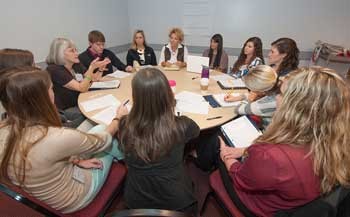Interdisciplinary Symposium builds teamwork across disciplines for tomorrow's clinicians, teachers and nurses

Students and faculty of the Waldron College of Health and Human Services convened Friday, Oct. 18, in Heth Hall to collaborate on behalf of Jessica, a hypothetical three-year-old with special needs.
A three-year-old child with special needs was the focus of more than 170 students and faculty during the Waldron College of Health and Human Services' Fall Interdisciplinary Symposium held in Heth Hall on Friday, Oct. 18.
Designed to introduce students in the WCHHS and the School of Teacher Education and Leadership (STEL) to the dynamics and mechanics of interprofessional teamwork, the event provided an opportunity to practice consulting and working with colleagues from other disciplines. Their goal was to prepare a comprehensive plan for helping the hypothetical Jessica and her family deal with a daunting set of physical, cognitive and medical conditions.
"These future professionals are learning and understanding today what other professionals can do and that will ultimately make each of them better health providers to their community,” said WCHHS Dean Kenneth Cox. "This is how it is done now; interprofessional teamwork is the best practice today."
The symposium, now in its third year, included graduate and undergraduate students from the nursing, speech pathology, occupational therapy, physical therapy, social work and teacher education programs. In 14 groups, moderated by a faculty member, the students assessed and developed a care plan or individual education plan that would provide Jessica and her family suggestions to support her development and health.
"Working around a table like this was so helpful," said Phillip Thomas, a second-year student in the Doctor of Physical Therapy program. "24/7, we are thinking about our own profession and skill sets and how they apply to a case. The chance to interact with other professionals can really help complete the picture or puzzle of patient care. It was an epiphany for me."
Thomas and his group were tasked with assessing Jessica and her family, developing a problem list, identifying the components of a proposed care plan as well as barriers to success that would need to be overcome. In the process, they were enlightened by their fellow students' different assessments, methodologies and viewpoints on Jessica's situation. In the course of their 90-minute long conversation around the table, they shared knowledge of their disciplines, protocols and terminology as they sought to define an umbrella approach that would help but not overwhelm Jessica and her family.
"This was a unique opportunity for us all to learn what colleagues can offer," said Emmanuel John, associate professor of physical therapy, who worked with one of the groups. "The talk at the table was very intense as they worked to understand the conditions, the culture of the situation and their colleagues."
Christina Cahill, a graduate student in early childhood education, appreciated the chance to participate in an event that mirrors the way things are done on behalf of children with special needs.
"Every child with whom I work will be different. Today's experience gave me many ways to explore as I help my clients," she said.
The holistic approach in which the students were working was also of value to Lindsay Dawson, a senior nursing student, who said, "As a nurse trying to assess the whole patient, I will benefit from all the perspectives, experience and knowledge I can get and it was interesting to hear what each brought to the table."
To open the symposium, Kathryn Hoover, associate professor of teacher education and leadership, provided a keynote address during which she briefed the students about the current laws guiding the care and treatment of young children with disabilities.
Sheila Krajnik, instructor of occupational therapy and coordinator of the symposium, said, "It used to be that students would just be tossed onto teams once they went out to practice in a variety of settings. To fully prepare them for success, this is a way we can help get them used to learning from other colleagues, advocating for their professions and negotiating for their client or patient."